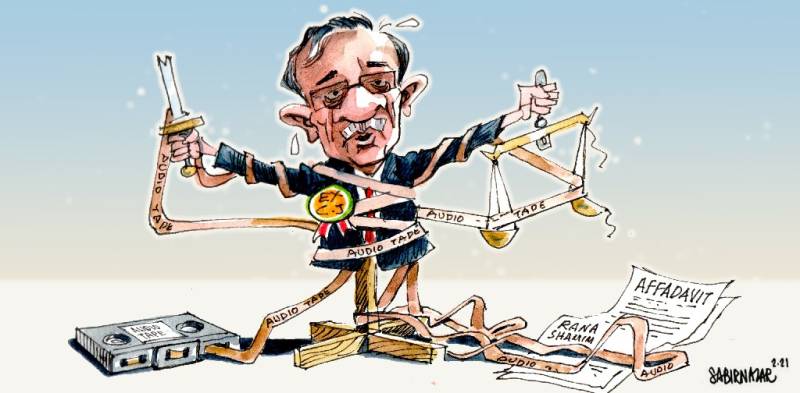
Until recently, despite three naked seizures of power lasting over 30 years, the Miltablishment was
But these perceptions have been significantly eroded in recent times. The Emperor has been exposed as a scheming, hypocri
Now it is the turn of the judges. Since independence, the judiciary was perceived to be a handmaiden to the executive, a hangover from colonial times when such was indeed the case in political matters of concern to the imperialist administration. But a degree of “independence” was imposed by a democratic constitution in 1973 which gave scope for shrugging away the burden of the executive. Unfortunately, however, this was eclipsed by decades of martial rule when the man on horseback wielded the sword of necessity over the judges and cut them to size. A brief revival took place when the Lawyers Movement in 2008-2009 against a military dictator elevated the rebels led by ex-CJP Iftikhar Chaudhary to self-appointment and self-accountability status, overriding parliament and the executive. Unfortunately, however, the new bench soon lost respect in the eyes of the bar and media that had restored it to power following the ego-centric, hypocritical, way
Five recent incidents have thus far demeaned and exposed the higher judiciary. The first case related to the independent and brave supreme court judge, Qazi Faez Isa,who dared to expose the unconstitutional machinati
The fourth pillar of the state, the media, has already turned against the Miltablishment and Judiciary by reflecting the sentiment of the public.
The Pakistan Democratic Movement senses all this but is unable to chart the way forward for several reasons. The PPP fears that if it strays too far out of line from the Miltablishment, Asif Zardari will be incarcerated, the party will be ousted from office in its last stronghold of Sindh and be relegated to the dustbin of history. The PMLN is divided between the opposing political outlook of two brothers who cannot be parted even though their joint struggle is the very cause of their own impotence that has created confusion and de-motivation in the rank and file of the PMLN.
Sooner than later, however, something will give. The situation is primed for it. Either popular pressure originating from comprehensive hybrid regime failure to manage the economy and state will compel the Miltablishment and/or judiciary to review options and abandon Imran Khan. Or the PDM will finally find a windfall political opening to surge ahead with confidence and besiege Islamabad. The tragedy of Pakistan is that in such a potentially revolutionary moment when the masses are waking up to the sham sanctity of post-colonial state institutions and are ready to challenge them, the opposition is unable, even unwilling, to seize the day.
But these perceptions have been significantly eroded in recent times. The Emperor has been exposed as a scheming, hypocri
Now it is the turn of the judges. Since independence, the judiciary was perceived to be a handmaiden to the executive, a hangover from colonial times when such was indeed the case in political matters of concern to the imperialist administration. But a degree of “independence” was imposed by a democratic constitution in 1973 which gave scope for shrugging away the burden of the executive. Unfortunately, however, this was eclipsed by decades of martial rule when the man on horseback wielded the sword of necessity over the judges and cut them to size. A brief revival took place when the Lawyers Movement in 2008-2009 against a military dictator elevated the rebels led by ex-CJP Iftikhar Chaudhary to self-appointment and self-accountability status, overriding parliament and the executive. Unfortunately, however, the new bench soon lost respect in the eyes of the bar and media that had restored it to power following the ego-centric, hypocritical, way
Five recent incidents have thus far demeaned and exposed the higher judiciary. The first case related to the independent and brave supreme court judge, Qazi Faez Isa,who dared to expose the unconstitutional machinati
The fourth pillar of the state, the media, has already turned against the Miltablishment and Judiciary by reflecting the sentiment of the public.
The Pakistan Democratic Movement senses all this but is unable to chart the way forward for several reasons. The PPP fears that if it strays too far out of line from the Miltablishment, Asif Zardari will be incarcerated, the party will be ousted from office in its last stronghold of Sindh and be relegated to the dustbin of history. The PMLN is divided between the opposing political outlook of two brothers who cannot be parted even though their joint struggle is the very cause of their own impotence that has created confusion and de-motivation in the rank and file of the PMLN.
Sooner than later, however, something will give. The situation is primed for it. Either popular pressure originating from comprehensive hybrid regime failure to manage the economy and state will compel the Miltablishment and/or judiciary to review options and abandon Imran Khan. Or the PDM will finally find a windfall political opening to surge ahead with confidence and besiege Islamabad. The tragedy of Pakistan is that in such a potentially revolutionary moment when the masses are waking up to the sham sanctity of post-colonial state institutions and are ready to challenge them, the opposition is unable, even unwilling, to seize the day.

